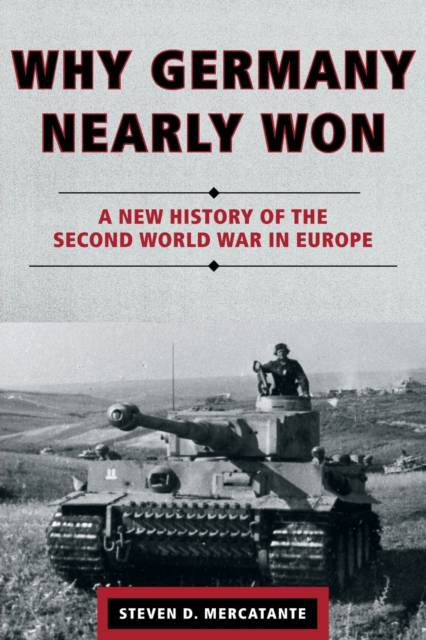
- Afhalen na 1 uur in een winkel met voorraad
- Gratis thuislevering in België vanaf € 30
- Ruim aanbod met 7 miljoen producten
- Afhalen na 1 uur in een winkel met voorraad
- Gratis thuislevering in België vanaf € 30
- Ruim aanbod met 7 miljoen producten
Zoeken
Why Germany Nearly Won
A New History of the Second World War in Europe
Steven D Mercatante
Paperback | Engels
€ 74,95
+ 149 punten
Uitvoering
Omschrijving
Why Germany Nearly Won challenges today's conventional wisdom, which explains Germany's Second World War defeat as inevitable primarily for reasons of Allied economic or military brute force created when Germany attacked the Soviet Union. Taking an entirely new perspective on explaining the Second World War in Europe, and its outcome, at its core Why Germany Nearly Won offers the reader three interrelated, unique, and potentially ground-breaking arguments. First, qualitative differences between the combatants proved more important in determining the war's outcome than have the quantitative brute force measures so commonly discussed in the past. Second, attacking the Soviet Union represented Germany's best opportunity to win a war that according to commonly cited measures of military potential, should have been completely out of Germany's reach. Third, for reasons frequently overlooked and misunderstood Germany came far closer to winning the war than has previously been recognized.
Specificaties
Betrokkenen
- Auteur(s):
- Uitgeverij:
Inhoud
- Aantal bladzijden:
- 426
- Taal:
- Engels
Eigenschappen
- Productcode (EAN):
- 9781442236868
- Verschijningsdatum:
- 10/07/2014
- Uitvoering:
- Paperback
- Formaat:
- Trade paperback (VS)
- Afmetingen:
- 153 mm x 232 mm
- Gewicht:
- 580 g

Alleen bij Standaard Boekhandel
+ 149 punten op je klantenkaart van Standaard Boekhandel
Beoordelingen
We publiceren alleen reviews die voldoen aan de voorwaarden voor reviews. Bekijk onze voorwaarden voor reviews.











